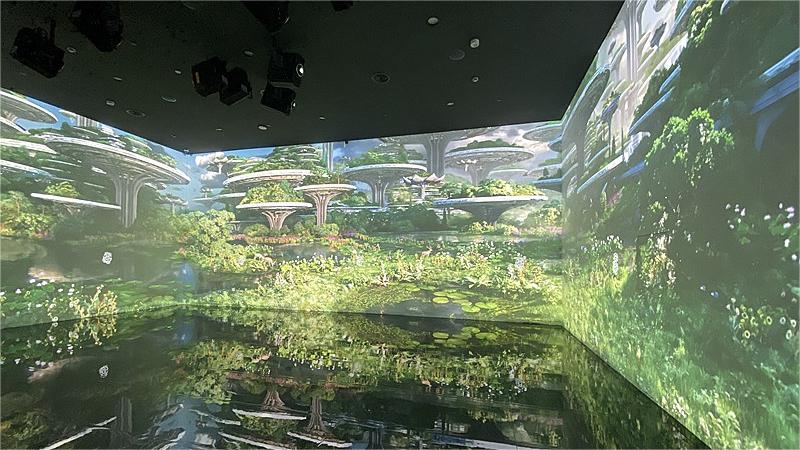Eco-friendly crab farm in E China sets example of efficient, high-quality aquaculture
A demonstration eco-friendly crab farm by the Taihu Lake in Wujiang district, Suzhou, east China's Jiangsu province has completed a perfect transition - abandoning traditional practices using net enclosure, which featured high pollution and low economic return, and embracing high-quality and high-efficiency ecological aquaculture.
From a distance, the crab farm, which is located in Pujiangyuan, Qidu township of Wujiang district, appears like a picturesque rural park, but up close, it reveals itself as a hive of agricultural activity.

Photo shows the eco-friendly crab farm by the Taihu Lake in Pujiangyuan, Wujiang district, Suzhou, east China's Jiangsu province. (Photo from the public account of Qidu township, Wujiang district on WeChat)
In the ponds, crab farmers are always seen clearing out aquatic weeds, while on the banks, technicians use mobile phones to pilot drones that disperse feed pellets over the water.
This eco-friendly crab farm was established, after net enclosure aquaculture facilities were banned in the Taihu Lake in 2019.
Zhang Jianliang, 53, has been engaged in crab farming for over 20 years. When he was younger, he once used net enclosure facilities on the Taihu Lake.
A few years ago, he contracted 100 mu (6.67 hectares) of crab ponds in the eco-friendly crab farm. "It's completely different from the past. It's tech-ish," he told People's Daily.
"This is an Internet-of-Things (IoT) automatic control system for aquaculture," said Zhang, pointing to a silver-white metal box on the shore.
He said the biggest concern in crab farming is low dissolved oxygen levels in the water, which could only be judged based on farmers' experience in the past.
He opened the metal box, and real-time parameters were all displayed on an electronic screen, including dissolved oxygen, pH, and water temperature.
For instance, the dissolved oxygen level, after being obtained by underwater sensors, will be automatically analyzed by the system. If it falls below a preset "red line," the system will automatically activate an oxygenation device to avoid oxygen depletion in the water.
The crab farm is all about technology. On the water surface, unmanned feeding boats cruise automatically. Under the water, IoT flow generators work to simulate a real lake environment to help crabs grow better.
According to Cao Jianzhong, an executive of the crab farm, the farm has invited experts from agricultural universities and enterprises to launch on-site training.
"With the use of technology, oxygenation and feeding have become more targeted. It saves labor, giving us more confidence," said Zhang.
In the past, net enclosure aquaculture in the Taihu Lake was completely at the mercy of the weather, and sometimes the farmers would shoulder losses, according to Zhang.
Today, in the eco-friendly crab farm, standardized farming keeps risks under control. It's easy for a farmer to earn 200,000 yuan ($27,678) to 300,000 yuan a year.

Photo shows a smart management platform of the eco-friendly crab farm by the Taihu Lake in Pujiangyuan, Wujiang district, Suzhou, east China's Jiangsu province. (Photo from the public account of Qidu township, Wujiang district on WeChat)
The crab farm covers a total planned area of 27,255 mu, with a 4,225 mu core area, generating an annual output value of around 400 million yuan.
For an aquaculture park of this scale, located along the shoreline of the environmentally sensitive Taihu Lake, how is environmental safety ensured?
On the eastern side of the farm, there are several water pools, which are covered by reeds and occasionally disturbed by waterfowl taking wing.
"Fine sand, zeolite, and limestone are paved at the bottom of these pools," said Xi Bin, a management staff member of the farm, adding that it is an ecological treatment system consisting of ecological trenches, ecological ponds, vertical-flow wetlands, and surface-flow wetlands.
Designed by the Institute of Hydrobiology, Chinese Academy of Sciences, the system employs a compound artificial wetland tail water treatment technique to absorb and purify the aquaculture effluent.
"The treated water flows through an intricate network of pipes back into the individual crab ponds. None of it is discharged into the Taihu Lake," said Xi.
At 2 pm, technician Xu Junyu of the crab farm received a request for drone support from aquaculture farmer Zhou Shengliang via a smart platform. Xu soon made his way to Zhou's crab pond.
Deftly assembling the drone, Xu loaded a bag of feed pellets into the drone's hopper. With everything prepared, Xu issued commands from his phone, and the drone, equipped with both BeiDou and GPS navigation systems, took to the air over the crab pond.
"I've pre-programmed the speed, heading, and feeding density into the digital system for timed, quantified, and targeted feeding," said Xu. For a 30 mu crab pond, manual feeding would take at least half a day, but the drone could complete the task in just minutes.
To provide comprehensive services for aquaculture farmers, the crab farm has employed IoT, cloud computing, big data and other technologies to give aquaculture production a "smart brain."
The "smart brain", or the smart management platform, is located at an inspection and quarantine center on the eastern side of the crab farm. It has a huge electronic screen and integrates functions such as an overview of the entire farm, intelligent aquaculture management, quality control, and daily operations management. It is learned that crab ponds in the farm are installed with various sensors providing data to support scientific and targeted aquaculture.
The eco-friendly crab farm provides comprehensive supporting services. In a logistics and distribution center, there are various types of automated equipment. Crabs are fed into an automatic binding machine and bound in around 5 seconds; a conveyor line automatically sorts the crabs by weight.
Through an internet-enabled production and marketing model, the crab farm has guided and enabled aquaculture farmers and rural entrepreneurs to increase their incomes.
Photos
Related Stories
- Chinese agricultural technologies attract visitors at Africa fertilizer expo
- Tech-savvy 'new farmer' in NE China enjoys fruits of modern agriculture
- Iraqi officials borrow wisdom in China's smart agriculture
- China allocates almost 1.42 bln yuan for rural pest control
- Australian, Chinese researchers make breakthrough in fighting wheat disease
Copyright © 2024 People's Daily Online. All Rights Reserved.









